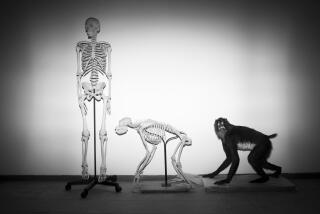Heat Was ‘Key to Evolution,’ Scientist Says
- Share via
LONDON — A British scientist believes ancestors of the human race first began to walk erect when they moved from forests into the open and found it too hot to stay down on all fours.
“Between 4 (million) and 7 million years ago, they began walking upright to keep cool because an upright animal exposes only one-third of its surface to the sun’s rays compared to a four-legged animal,” said Peter Wheeler, director of biological and earth sciences at Liverpool Polytechnic.
Many anthropologists have said that ancestors of humans rose to two legs to make it easier to hunt, scavenge, use tools or see prey.
“But I believe heat was the key to evolution,” Wheeler said in a telephone interview.
“It appears that because of global climate change, the rain forest covering Africa began to fragment and shrink in size when temperatures rose and caused increasing aridity,” he said. That led some early humans to colonize the unforested areas, including savannas, he said.
“Out on the African savanna, a four-legged animal must often have been on the verge of heatstroke, so heat regulation was the reason why early man evolved,” the scientist said.
He said walking on two legs also required less water--about 2 1/2 pints for a biped compared to 4 1/2 pints for a knuckle-walking ape. That enabled bipeds to range farther in hot weather when looking for food.
Wheeler said most of his work was mathematical, but he was helped by an articulated, scale-model ape man, 1 foot tall, which he named Boris.
Boris was studied in a wind tunnel and from photographs to measure areas exposed to airflow and the sun.
Wheeler said a creature standing upright has more of its body surface off the ground where the cooler, faster-moving air carries heat away from the body.
“That means the body doesn’t have to sweat out its water reserves and, at low walking speeds, bipedalism is more efficient than walking on the feet and knuckles, as the muscles are generating less heat for the body to dissipate,” he said.
Robert Foley, a biological anthropologist at Cambridge University, said he was “very impressed’ by Wheeler’s studies, published earlier this year in the Journal of Human Evolution, edited in London and New York.
“His is one of the better explanations of the factors that lay behind early man starting to walk upright,” said Christopher Stringer, head of the human origins group at London’s Natural History Museum.
“I don’t say it is the answer, as there is some evidence of early man walking upright in partly forested conditions. But heat control is a completely different line of approach,” Stringer said.
Wheeler, 35, said his conclusions led him to tackle one of the greatest mysteries of human evolution: why the brain expanded.
“I believe that once humans could control their body temperatures, the brain--which is the part of the body most vulnerable to heat--could grow larger,” he said.
“It is probably no coincidence that today, man--who has the most highly developed brain--is also the species with the most powerful and effective cooling system to protect it: a combination of being upright, naked skin and the ability to sweat,” Wheeler said.




